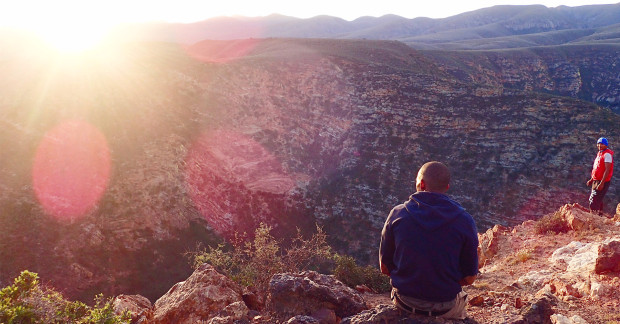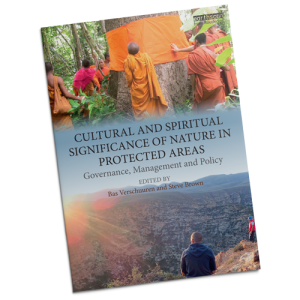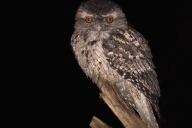A much-anticipated book on the Cultural and Spiritual Significance of Nature in Protected Areas has recently been published by Routledge/Earthscan. [Order here]. I am delighted to have contributed a chapter entitled “Meaningful nature experiences: Pathways for deepening connections between people and place”.
The book’s editors, Bas Verschuuren and Steve Brown, emphasise that intangible values with nature are the driving forces underlying our sense of connectedness with the more-than-human world.
Cultural and spiritual bonds with ‘nature’ are among the strongest motivators for nature conservation; yet they are seldom taken into account in the governance and management of protected and conserved areas.
Therefore the book as a whole aims to provide a starting point for emphasising the wide range of beliefs, values and experiences that motivate action to conserve earth’s diversity. To this end, my conceptual chapter on meaningful nature experience demonstrates their importance in connecting people with places in ways that shape worldviews and commitments toward conservation.
Evidence suggests that protected areas and their biodiversity are both hosts and triggers for ‘meaningful nature experiences’: non-ordinary experiences with/in nature which are particularly profound, significant, affective, and difficult to wholly describe. Yet less is understood about the ‘what’ and the ‘how’. In other words: What makes such experiences meaningful enough to motivate pro-environmental behaviour and how can this be enabled through particular settings?
The chapter synthesises phenomenological research (qualitative research that is used to described how humans experience a certain phenomenon) conducted to reveal the personal and situational contexts most commonly associated with meaningful nature experiences.
For example, within protected areas, perceived attributes of ‘remoteness’, ‘naturalness’, ‘beauty’ and ‘wildness’ seemed most likely to induce heightened states of emotion (e.g. awe), sensory awareness (e.g. captive attention) and cognitive shifts (e.g. humility) that move from self-interest to collective-interest. Interactions with particular species are most likely to be considered profound when spatial (e.g. close proximity) and temporal (e.g. extended length of encounter) dimensions are activated. The opportunity to commune with ‘the other’ redefines one’s own sense of being and place in the world.
“Insights from this research reinforce the notion that direct nature experiences are instrumental in calibrating values and orientations in support of conservation in general, as well as towards specific areas where people assign a collection of meanings to them over time”, says author Matthew Zylstra.
He adds that, “These cumulative experiences deepen our connectedness with places, so much so that they come to form a part of our own identity and an expanded sense of self — so caring for them is caring for ourselves.”
Meaningful nature experiences therefore illuminate the entanglement between the ‘inner’ world of experiences, values and worldviews with that of the ‘outer’ world of biology, behaviours and systems. They can open an awareness that dissolves ingrained perceptual boundaries and dualistic patterns of thought that might otherwise inhibit a felt sense of integration with the world at large.
Matthew believes that, “Ultimately, the real meaningfulness is in feeling an integral part of a unified whole. That direct sense of ‘inner knowing’ — of belonging to something bigger than oneself — can shift worldviews in ways that little else can, especially when it comes to forming durable motivations for conservation.”
This chapter and book contributes to an ongoing programme led by the IUCN Specialist Group on the Cultural and Spiritual Values of Protected Areas (CSVPA) to develop relevant guidelines for policy and management.
Chapter Abstract
Substantial evidence suggests that protected areas are vital hosts for ‘meaningful nature experiences’: non-ordinary experiences with/in nature which are particularly profound, significant, affective, and difficult to wholly describe. This chapter phenomenologically explores the foundations of such experiences and identifies common themes, structures, and contexts underpinning these events. Findings highlight the importance of meaningful nature experiences in deepening one’s connectedness with nature, sense of place, and commitment towards pro-environmental and pro-social action. In triggering a more unified view of existence, meaningful nature experience invites an integral approach that supports individual and collective bonding with both the protected areas and the world at large.
View the full chapter on Google Books »
Front cover photo (below): Baviaanskloof Nature Awareness Group by Matthew Zylstra.
This book forms part of the ongoing programme of work driven by the IUCN Specialist Group on the Cultural and Spiritual Values of Protected Areas.
Citation:
Zylstra, M.J. (2019). Meaningful Nature Experiences: Pathways for Deepening Connections Between People and Place (Chapter 3, pp. 40-57) in Verschuuren, B. (Ed.), Brown, S. (Ed.). (2019). Cultural and Spiritual Significance of Nature in Protected Areas. London: Routledge.
Whilst not a focus in this publication, broader research on this topic (see Zylstra 2014) has explored the ways in which the presence of invasive species affects the quality of meaningful nature experiences, as well as the resulting impacts on perceptions, motivations and personal responsibilities toward conservation and ecological restoration.
Other relevant publications:
Zylstra, M. J. (2014). Exploring meaningful nature experience, connectedness with nature and the revitalization of transformative education for sustainability. PhD dissertation. Stellenbosch University, Stellenbosch. Retrieved from http://scholar.sun.ac.za/handle/10019.1/86290
Kull, C. A., Shackleton, C. M., Cunningham, P. J., Ducatillon, C., Dufour-Dror, J.-M., Esler, K. J., … Zylstra, M. J. (2011). Adoption, use and perception of Australian acacias around the world. Diversity and Distributions, 17(5). https://doi.org/10.1111/j.1472-4642.2011.00783.x
Zylstra, M. J., Knight, A. T., Esler, K. J., & Le Grange, L. L. (2014). Connectedness as a Core Conservation Concern: An Interdisciplinary Review of Theory and a Call for Practice. https://doi.org/10.1007/s40362-014-0021-3
Zylstra, M., Esler, K., Knight, A., & Le Grange, L. (2019). Integrating multiple perspectives on the human-nature relationship: A reply to Fletcher 2017. Journal of Environmental Education, 50(1), 1–10. https://doi.org/10.1080/00958964.2018.1497582
Original Source: The Value of Meaningful Nature Experiences (Oct. 2018). News from the DST-NRF Centre of Excellence for Invasion Biology (who also funded the the PhD research from which this chapter was derived).
For more information, contact Matthew Zylstra: matt@eyes4earth.org













Be the first to share a comment